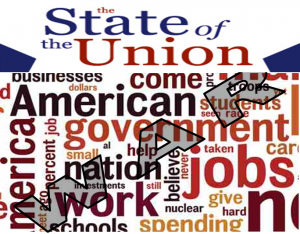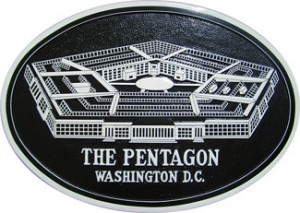 With the end of U.S. troop presence in Iraq and according to many leading economist, the "Great Recession" having ended over 18 months ago in June 2010, President Obama in his State of the Union Address attempted to turn the last page on the Bush II era and outline his vision for a new America.
With the end of U.S. troop presence in Iraq and according to many leading economist, the "Great Recession" having ended over 18 months ago in June 2010, President Obama in his State of the Union Address attempted to turn the last page on the Bush II era and outline his vision for a new America.
 The President demonstrated the truth about these misplaced priorities when he referenced a $500 billion savings from the Pentagon budget. Upon closer examination, these so-called savings are not really cuts, but rather a reduction in previously projected increases in Pentagon spending. In fact the Pentagon budget will not be cut at all but will continue to grow even though at present the U.S. accounts for approximately 41% of global military expenditures. The U.S. budget is 6 times more than the next highest spender, China. Moreover, while $500 billion sounds like a lot, the number is over a 10 year period in which total Pentagon spending will top $700 trillion dollars. The "savings" amounts to less than 7%.
At a time of rising budget deficits, millions suffering from job loss, mortgage foreclosures, homelessness and a bleak economic future, our nation is at a crossroads. With the end of the Iraq War, the death of Osama bin Laden and the relative demise of al Qaeda, we must look back on the past ten years and ask ourselves what have we learned? Was war the answer to the problems we faced as a nation the morning of September 12, 2001? Did we lead ourselves into the conflict with blowback from years of a foreign policy based on exploiting Islamic violent jihad against the former Soviet Union? Did our friendly relationship with dictators like Saddam Hussein and Hosni Mubarak put us on the wrong side of history? As we look to the future will militarism and the pursuit of economic and political world dominance simply lead to more distrust and conflict as Arab nations emerge from their peoples' movements for self-government and self-determination? Is it really possible for the U.S. to impose its will on the expanding economic powers of Brazil, Russia, India and China? Can the U.S. really claim to champion freedom while at the same time direct a global empire not that different from the one the founding generation decided they had to break free from?
The President demonstrated the truth about these misplaced priorities when he referenced a $500 billion savings from the Pentagon budget. Upon closer examination, these so-called savings are not really cuts, but rather a reduction in previously projected increases in Pentagon spending. In fact the Pentagon budget will not be cut at all but will continue to grow even though at present the U.S. accounts for approximately 41% of global military expenditures. The U.S. budget is 6 times more than the next highest spender, China. Moreover, while $500 billion sounds like a lot, the number is over a 10 year period in which total Pentagon spending will top $700 trillion dollars. The "savings" amounts to less than 7%.
At a time of rising budget deficits, millions suffering from job loss, mortgage foreclosures, homelessness and a bleak economic future, our nation is at a crossroads. With the end of the Iraq War, the death of Osama bin Laden and the relative demise of al Qaeda, we must look back on the past ten years and ask ourselves what have we learned? Was war the answer to the problems we faced as a nation the morning of September 12, 2001? Did we lead ourselves into the conflict with blowback from years of a foreign policy based on exploiting Islamic violent jihad against the former Soviet Union? Did our friendly relationship with dictators like Saddam Hussein and Hosni Mubarak put us on the wrong side of history? As we look to the future will militarism and the pursuit of economic and political world dominance simply lead to more distrust and conflict as Arab nations emerge from their peoples' movements for self-government and self-determination? Is it really possible for the U.S. to impose its will on the expanding economic powers of Brazil, Russia, India and China? Can the U.S. really claim to champion freedom while at the same time direct a global empire not that different from the one the founding generation decided they had to break free from?
 The challenge lies before us. As peacemakers and justice seekers working with emerging and growing movements like the Occupations, and across the full spectrum of economic and social justice struggles, we must develop, communicate and live a new vision of human coexistence and international cooperation. With the world facing the Armageddon - like threats of climate change and nuclear war - the future of the world rests in our hands and in the urgency of our efforts. We must unite in our determination to change the priorities of our country. Most important, we must practice what we preach: tolerance, peace and justice providing a model of our vision to follow and not just empty words to be ignored. Now is the time. Let us think, let us plan and let us act.
The challenge lies before us. As peacemakers and justice seekers working with emerging and growing movements like the Occupations, and across the full spectrum of economic and social justice struggles, we must develop, communicate and live a new vision of human coexistence and international cooperation. With the world facing the Armageddon - like threats of climate change and nuclear war - the future of the world rests in our hands and in the urgency of our efforts. We must unite in our determination to change the priorities of our country. Most important, we must practice what we preach: tolerance, peace and justice providing a model of our vision to follow and not just empty words to be ignored. Now is the time. Let us think, let us plan and let us act.








